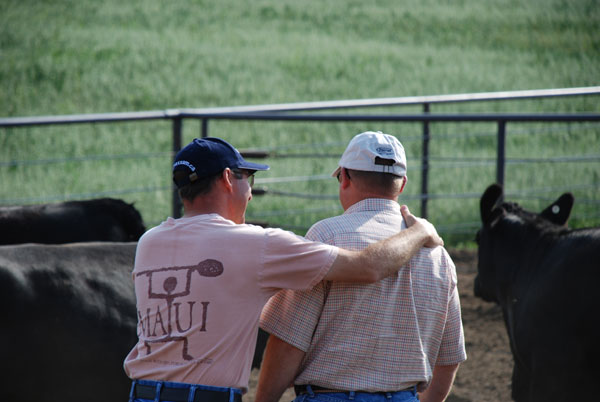Hey cowboy! Let’s talk (better)
Like most things, good communication can be boiled down to having a goal in mind, being committed, having a good attitude and being open and flexible.

Ranchers aren’t known for being great communicators, and my kids, my ex and my employees would probably all confirm that. Not that I’m the stoic cowboy myth, I probably just have never taken the time to really hone my communication skills.
I am guilty of assuming. Assuming that people know which pasture, which cow or which goal I’m referring too. Or assuming that they already know XYZ, or why we are doing XY and Z. In part, it is making assumptions, but it is also that I think about four times more things than I actually say.
Has this happened to you? Sometimes I think I mentioned something, but I probably only did it in my own mind. In retrospect, I feel kind of guilty that the person I’m talking to usually only hears half the conversation or every other sentence, because the rest is just being conducted in my mind.
Another communication bottleneck is one of styles. Most people would probably think that I would have no problem with confrontational communication. I love a good debate, I’m not particularly empathetic and I tend to have strong opinions. However, while I love the give and take and analyzing the pros and cons of about anything, I’m only good with the battle being one of intellect. When it becomes emotional, then I suddenly have no desire at all to talk.
I’m one of those people who tends to engage in small talk at the very beginning; jumping right into business without the personal discussion on the front end seems rude to me. However, others are the “land the plane” type of communicators; let’s get to it and get it done. Small talk or that personal connection is an affront to them. It has taken me a lot of years to figure out my communication quirks and I’m not always adept at picking up on other people’s communication styles, especially at the beginning.
I realize that the key to communicating is starting the process and actually talking to someone with the goal of communicating with them. However, I’m sure you have all been in those situations where talking is the exact opposite of communication, where the more you attempt to communicate, the more you increase misunderstanding.
Things have a way of happening fast in agriculture, and lots of times you are communicating with family and friends as well as business associates, so there are a lot of dynamics that make communication difficult. Like most things, good communication can be boiled down to having a goal in mind, being committed, having a good attitude and being open and flexible.
A horse trainer told me once that you can learn all you need to know about communication by learning to communicate with a horse; you can make a great connection but you have to guide the ship, the horse doesn’t really care. Communication is mostly non-verbal cues and signals, and the best horsemen are the ones who truly listen to what the horse is telling them.
One style doesn’t fit all you have to be flexible. Put in the time, be patient, don’t lose your temper and be consistent in your purpose and effort.
The opinions of Troy Marshall are not necessarily those of beefmagazine.com and Farm Progress.
About the Author(s)
You May Also Like





